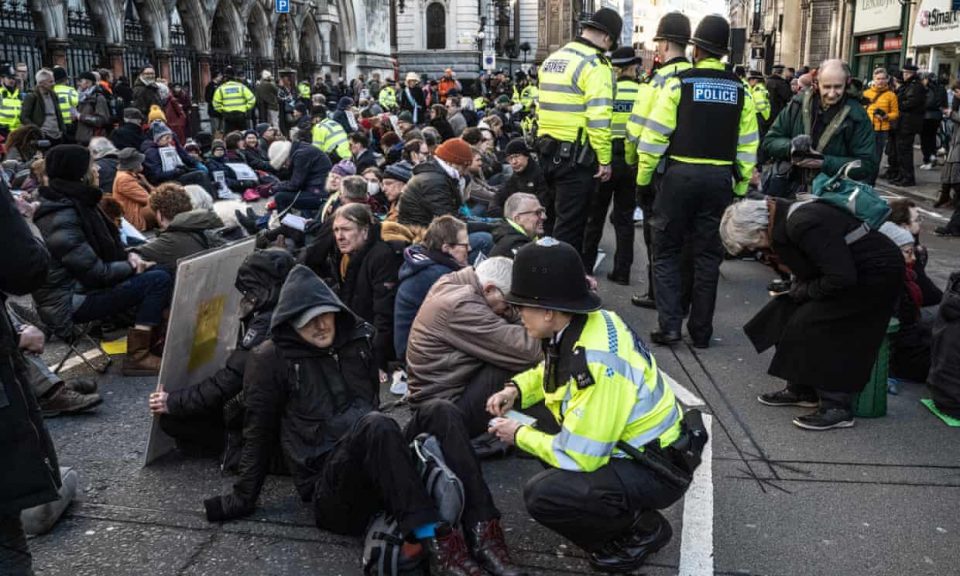A significant number of demonstrators have obstructed the roadway outside the High Court in London, where appeals concerning 16 imprisoned climate activists are currently being deliberated. The protesters voiced their opposition to what they perceive as “the corruption of democracy and the rule of law.”
As England’s top judge examined the arguments in the appeals concerning the Just Stop Oil activists—who collectively face a lengthy 41-year incarceration—supporters sat silently on the road brandishing signs labeling them as “political prisoners.”
Tim Crosland, a member of the organization Defend Our Juries, which orchestrated the demonstration, noted that approximately 1,000 individuals had pledged to participate leading up to the event on Thursday, although an informal count indicated that the turnout might have exceeded this number.
“This gathering reflects hundreds of individuals who have come to deliver a clear message to the court: suppressing and imprisoning people who seek to inform the public is unacceptable,” Crosland stated. “This illustrates the corruption of democracy and the principles of law rather than its upholding.”
He elaborated that these activists were incarcerated for attempting to disseminate crucial information that fossil fuel companies have systematically hidden from the public for many years. “Access to good information is essential for democracy, and the reason these individuals have been imprisoned is because they endeavored to share that with the public.”
Demonstrators held placards bearing images of the incarcerated activists, including those whose situations were under review in the court, as well as renowned political prisoners like Angela Davis and Nelson Mandela, whom Crosland mentioned “fought for the freedoms we cherish.”
Among those participating in the protest were broadcasters Hugh Fearnley-Whittingstall and Chris Packham. Fearnley-Whittingstall expressed concerns about the erosion of their fundamental democratic right to protest peacefully, stating, “We stand united with the 16 defendants, who received harsh sentences last year for participating in entirely peaceful protests driven by their moral beliefs, not for personal advantage. It appears the legal system now views acting on one’s conscience as a factor that could worsen a sentence, whereas it used to be considered a mitigating factor.”
Shortly after the protesters settled on the Strand, they were approached by police officers in yellow jackets, who cautioned them that failure to disperse could result in a Section 14 order being imposed, leading to arrests. The Metropolitan Police reported that the protesters left the road at 1:45 PM with “no arrests made as there was no significant disruption.”
Inside Court Four of the Royal Courts of Justice, Jocelyn Ledward KC represented the Crown in response to the appeals. Ledward previously conducted the prosecution of five activists who were issued the longest sentences in history for peaceful protest for their involvement in disrupting the M25.
Roger Hallam, co-founder of Just Stop Oil and Extinction Rebellion, received a five-year sentence for his role in the conspiracy, while his four co-defendants were each sentenced to four years.
In addressing the judges led by Lady Chief Justice Carr, Ledward asserted, “The sentences imposed were neither legally incorrect nor excessively harsh.”
Fiona Robertson, another member of the Crown’s legal team, commented, “These five defendants were the driving force behind what was intended to be the most significant disruption in British history.”
In their court submissions, the Crown’s attorneys challenged the appellants’ assertion that the judges erred by not allowing for leniency in their sentences due to their conscientious motivations, arguing instead that such considerations should only apply if protests are conducted with restraint regarding the harm inflicted.
Referring to Carr’s previous decision to uphold the sentences of Morgan Trowland and Marcus Decker, the lawyers pointed out: “The repeated mention of the word ‘may’ indicates that it is a discretionary power, not a mandatory requirement, to adjust the sentence to reflect a conscientious motive.”
A ruling on the matter is anticipated within one to six weeks.


